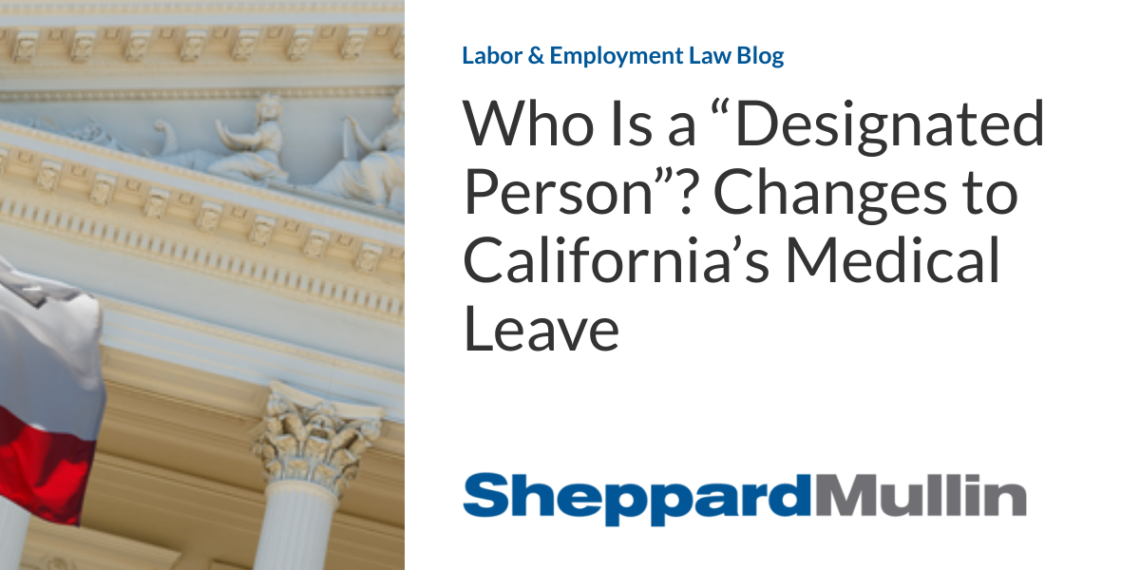[ad_1]
The Bill
The Expansion of California Family Rights Act, AB 1041, was signed into law by Governor Newsom on September 29, 2022. AB 1041 expands the class of people for whom an employee may take leave to care for under the California Family Rights Act (“CFRA”) to include a “designated person.” AB 1041 also expands the term “family member” under the Healthy Workplaces, Healthy Families Act (“HWHFA”), which governs paid sick day leave, to include “designated person.”
Previously, employees could take job-protected leave under the CFRA to care for a child, parent, parent-in-law, grandparent, grandchild, sibling, spouse, or registered domestic partner. AB 1041 now allows employees to take leave to care for an additional “designated person.” AB 1041 defines “designated person” under the CFRA as an individual related to the employee by blood or whose association with the employee is equivalent to a family relationship. There has not yet been further clarification of what an association equivalent to a family relationship may mean or the outer limits of the new expanded category.
Under the HWHFA, an employee could take paid sick leave to care for a “family member,” defined as a child, parent, spouse, registered domestic partner, grandparent, grandchild, or sibling. AB 1041 expands the definition of the term “family member” to include a “designated person.” Unlike under the CFRA, a “designated person” under the HWHFA need not be related to the employee by blood or the equivalent of a family relationship, but instead is simply a person the employee identifies at the time the leave is requested.
Under both the CFRA and the HWHFA, the employee is able to identify the “designated person” at the time the leave is requested. However, employers can affirmatively limit employees to one “designated person” in a 12-month period, though AB 1041 does not require the employee to identify the same “designated person” for leave under the CFRA and paid sick leave under the HWHFA. Additionally, employers may request the same health care certification for CFRA leave use for a “designated person,” as can be requested for CFRA leave for a child, parent, parent-in-law, grandparent, grandchild, sibling, spouse, or registered domestic partner.
AB 1041 also impacts California’s “kin care” law, which requires an employer to permit an employee to utilize accrued sick time to care for a family member. The kin care law specifically defines “family member” by reference to the definition of “family member” under the HWHFA discussed above.
Further, AB 1041 will impact the intersection between Federal and California medical leave. California employees taking leave to care for a “designated person” may not qualify as federal FMLA leave. Thus, it is possible that an employee can use more than 12 weeks of family and medical leave within a 12-month period.
Takeaways
AB 1041 will take effect January 1, 2023, so employers should review and update their policies to reflect the change in the law and allow for employees to take leave for “designated persons” to prepare for the upcoming year. Some specifics to take into consideration include updating current written policies and ensuring tracking systems are put in place to account for changes in when and how employees can take leave. Employers may consider revising their policies to restrict employees to designate one “designated person” in a 12-month period.
Employers should ensure any tracking systems in place are capable of documenting and tracking an employee’s one “designated person” per 12-month period, given that the “designated person” can be identified at the time the employee requests the leave.
Additionally, employers should be prepared to track the use of medical leave to care for an employee’s “designated person” and account for when such leave will and will not overlap with FMLA leave.
*Emma Husseman is a law clerk in the firm’s Century City office.
[ad_2]




